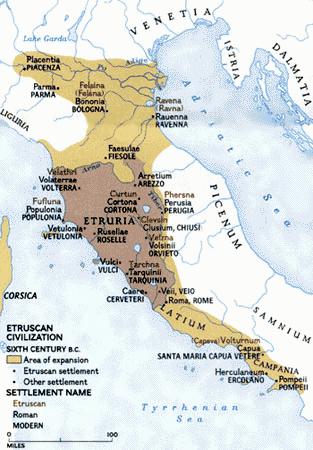
"Etruscan Warfare: Army Organization and Tactics." Topic
3 Posts
All members in good standing are free to post here. Opinions expressed here are solely those of the posters, and have not been cleared with nor are they endorsed by The Miniatures Page.
For more information, see the TMP FAQ.
Back to the Ancients Discussion Message Board
Areas of InterestAncients
Featured Hobby News Article
Featured Link
Featured Ruleset
Featured Showcase Article The last - the most elusive - set of dino skellies...
Featured Workbench Article The final warband for the Army for Bill.
Featured Profile Article The Editor is invited to tour the factory of Simtac, a U.S. manufacturer of figures in nearly all periods, scales, and genres.
Current Poll
Featured Book Review
|
Please sign in to your membership account, or, if you are not yet a member, please sign up for your free membership account.
| Tango01 | 08 Nov 2014 10:53 p.m. PST |
(Part I). "In antiquity, at least ten different ethno-linguistic groups shared the Italian Peninsula and the neighboring islands. Its fertile land attracted invaders and colonizers coming from various other regions. Only two of these ethno-linguistic families were Italian; the Latin group and the Osco-Umbrian group, which were a minority among the peoples of the newcomers. All the rest were migrants from elsewhere: The Iapyges (Iapygians) and the Piceni of eastern Italy spoke Proto-Illyrian languages, originating partly from the opposite Dalmatian coast. The Ligurians in the north-west were a very ancient people who formerly used to live in much of Western Europe. The Veneti or Eneti of the north-eastern country, ancestors of the modern Venetians, were in a similar ethno-linguistic position. Many scholars believe that they were an Illyrian people. The Siculi (or Sikels), Sardi and Corsi who lived in Sicily, Sardinia and Corsica respectively, have been linked by the modern researchers to two of the renowned "Sea Peoples" of the Aegean Sea who created havoc around the Eastern Mediterranean at the end of the Bronze Age, namely the Shekelesh (Shklsh) and the Sherden or Shardana (Shrdn). These two migrant seafaring tribes, rather of Anatolian origin, were possibly mixed with the Ligurian and Iberian (coming from Spain) natives of these islands to produce the aforementioned peoples. The Corsi seem to have been an offshoot of the Sherden/Sardi. The other two peoples of Sicily, namely the Elymi (Elymians) and the Sikani had rather Iberian origins. The Phoenicians, skillful Canaanite sailors and colonists, settled later in Sicily and Sardinia…"

Full article here link Amicalement
Armand |
| Lewisgunner | 10 Nov 2014 11:27 a.m. PST |
Wasn't the Roman system of divisions based upon money and therefore the same as the Erptruscan one ,in effect. |
| Mars Ultor | 10 Nov 2014 2:19 p.m. PST |
Might have been at the start, under the Servian army as recorded by Livy and Dionysus, because it makes sense from the standpoint of a hoplite army. But I don't think anyone can attest to the Etruscan system with nothing written by them. The dominant narrative that the last 3 kings of Rome were Etruscan and that Rome was dominated by Etruscans is a much disputed "fact". Very little that anyone can point to, even in Livy, to indicate any Etruscan takeover. (See T.J. Cornell "The Beginnings of Rome" vs. Gary Forsyth "A Critical History of Early Rome."). Cornell really tears into what he calls the "Etruscan myth" and I've read little in Forsyth so far that contradicts him [still reading]. There's just little evidence of a takeover except writers from 400 years later who contradict each other and their confusion can be demonstrated. Cornell presents Rome as a somewhat Hellenized city that developed differently out of the common culture shared alike by Romans and Etruscans and probably Sabines as well; not a borrowing of Etruscan ideas – according to him, Rome had its own contacts with Greeks (and this is proven archaeologically). Great books, both, though they are in contention over certain ideas. |
|

